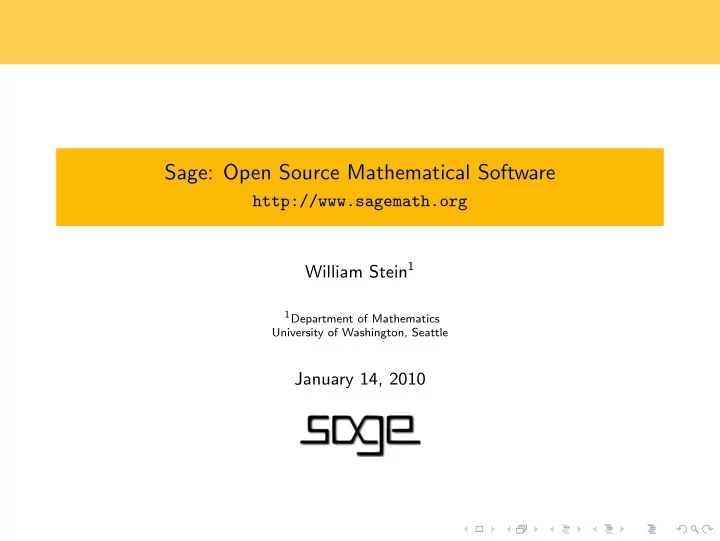

Sage: Open Source Mathematical Software http://www.sagemath.org William Stein 1 1 Department of Mathematics University of Washington, Seattle January 14, 2010
Sage: Creating a viable free open source alternative to Magma, Maple, Mathematica, and Matlab
History: I started the Sage project... 1997–1999 ( Berkeley ) HECKE – C++ (modular forms) 1999–2004 ( Berkeley , Harvard ) I wrote over 25,000 lines of Magma code. Feb 2005 I released SAGE-0.1 (almost 5 years ago) Feb 2006 UCSD SAGE Days 1 workshop – SAGE 1.0. ... May 2007 Sage NSF grant: funds Clement Pernet. [...] October 2007 Clay Math Institute SAGE Days 5 workshop. Nov. 2007 Sage wins Trophe´ es du Libre Nov. 2007 Heilbronn Institute SAGE Days 6 Feb,Mar 2008 IPAM Sage Days 7 ; Austin Sage Days 8 ... Dec 2009 Sage Days 18 on BSD at Clay Math Institute. January 2010 Sage Days 19 (bug days): starts Saturday. See http://wstein.org/mathsoftbio/ for way more background details.
Motivation I must be able to see inside and be able to change anything in my math software in order to do first rate computational number theory research. Open Source: analogous understanding the proofs of theorems you use in your research, instead of just taking them all as black boxes. Also, I care about graduate students and forcing them to use expensive closed software to do research with me is mean.
Nov 2007: Sage wins first place in Trophe´ es du Libre and gets slashdotted... Tons of articles all over resulted, about 10,000 downloads in a weekend, etc...
Sage: Mission Statement Mission Statement Provide a uniform open source high-quality viable alternative to Magma, Mathematica, Maple and MATLAB . When possible, do not reinvent the wheel but reuse existing building blocks . Make code that is: rigorously tested, easy to modify, very well documented, and peer reviewed. Also create a helpful environment and community (mailing lists, irc-channel, workshops, coding sprints). There are 1588 subscribers to sage-support , 1118 subscribers to sage-devel and about 3000 messages a month.
What is Sage? Sage is a very large mathematics software package developed by a worldwide community of over 200 developers. Sage is: 1 a huge new library , filling in gaps in functionality so Sage covers a wide range of algebraic, scientific, and statistical computing. 2 a distribution of the best free, open-source mathematics software available (Sage ships nearly 100 packages) that is easy to compile or install from binaries. 3 interfaces to almost all existing mathematics software packages (including Magma, PARI, GAP, Matlab, Mathematica, Maple, etc.)
Who Funds and Supports Sage Development?
Python Binds all things in Sage Together Python is a modern mainstream programming language. “Python is fast enough for our site and allows us to produce maintainable features in record times , with a minimum of developers,” said Cuong Do, Software Architect, YouTube.com. “Google has made no secret of the fact they use Python a lot for a number of internal projects. Even knowing that, once I was an employee, I was amazed at how much Python code there actually is in the Google source code system .”, said Guido van Rossum, Google , creator of Python. “Python plays a key role in our production pipeline. Without it a project the size of Star Wars: Episode II would have been very difficult to pull off. From crowd rendering to batch processing to compositing, Python binds all things together ,” said Tommy Burnette, Senior Technical Director, Industrial Light & Magic.
Python & Cython: The Languages of the Sage Project http://www.python.org and http://www.cython.org Python A mainstream language with millions of users. Cython : compiled Python, tightly integrated with Sage: Growing and getting used in other projects... Cython is a “killer feature”: Maple, Mathematica, and Magma have nothing like this
A Powerful Web-based Graphical User Interface public notebooks available at http://www.sagenb.org graphical user interface plotting LaTeX typesetting remote access worksheet sharing interface to 3rd party systems, e.g. Magma
Demo Demo 2 1 -2 -1.5 -1 -0.5 0.5 1 1.5 2 -1 -2 -3
Getting Started With Sage Web page: http://www.sagemath.org 1 Install Sage on your computer, or 2 Fully use Sage online at http://www.sagenb.org 3 Books, papers, and thousands of pages of documentation 4 Helpful mailing lists Number of http://sagenb.org accounts during the last month
Recommend
More recommend